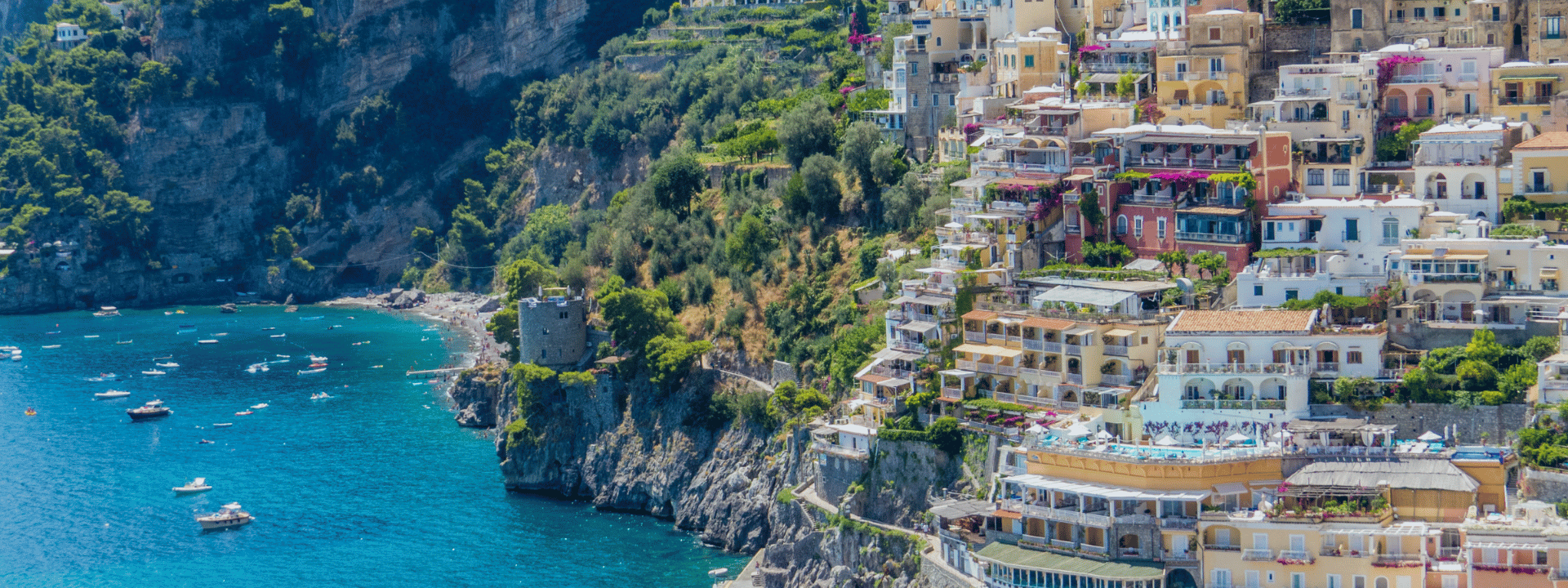Here's some quick facts about Italy:
Thinking of moving to Italy? Discover everything you need to know in our Ultimate Italy Relocation Guide.
Planning a relocation to Italy? You're not alone! Each year, thousands of expats choose this captivating Mediterranean country as their new home, drawn by its rich cultural heritage, stunning climate, exceptional quality of life, and the vibrant lifestyle that embodies la dolce vita.
Italy consistently ranks amongst Europe's most desirable destinations, offering an extraordinary blend of historical significance and modern sophistication, political stability within the EU, and diverse economic opportunities from the industrial north to the cultural heartlands of central and southern regions. From the Renaissance artworks of Florence to the romantic canals of Venice, the fashion capital of Milan to the ancient ruins of Rome, Italy provides expatriates with a unique living experience that combines world-class cuisine, centuries of history, and a Mediterranean lifestyle renowned across the globe.
This ultimate relocation guide will walk you through every essential aspect of moving to Italy, from immigration pathways to settling into Italian life. Beyond travel documents and housing, we’ll also cover practical logistics like shipping luggage to Italy - a crucial step for transporting your personal belongings safely and affordably. Whether you're planning to work, study, retire, reunite with family, or start a business, we'll provide you with the insights needed to make your transition as smooth as possible.
This ultimate guide covers all the essential aspects of relocating to Italy, including:
We hope this guide both inspires and informs you. Since information may vary based on individual circumstances, we strongly recommend conducting your own research alongside this guide to ensure your move to Italy goes smoothly.







When considering the best way to move to Italy, proper planning makes all the difference. The first step is determining the right immigration pathway for your situation, as this forms the foundation of your entire relocation. Once your immigration status is secured, you can focus on the practical aspects - organising luggage shipping to Italy for your belongings, finding temporary or permanent accommodation, and setting up essentials like banking, healthcare registration, and mobile phone services.
It's also wise to research different regions and cities beforehand to find areas that match your lifestyle preferences. Whether you're drawn to vibrant metropolitan centres like Milan and Rome, historic cities such as Florence and Venice, prefer coastal towns along the Mediterranean, or want to experience Italy's renowned countryside lifestyle, each region offers distinct advantages. By addressing these key details early, from flights to finances, you'll ensure a smoother transition and more time to settle into your new Italian adventure.
For EU Citizens: If you're an EU citizen, moving to Italy is straightforward as you have the right to live and work there without a visa. EU citizens can stay in Italy for up to three months without any requirements, and only need to register with local authorities if staying longer.
For Non-EU Citizens: Yes, if you're planning to immigrate to Italy from outside the EU, you'll need the appropriate immigration status. Choosing the correct pathway is crucial to the Italy relocation process, and starting early gives you ample time to gather documents and meet all requirements.
The type of immigration programme depends on your individual circumstances. Your options will vary based on factors such as your education, work experience, language skills, age, family connections in Italy, or whether you have a job offer. Many people wonder "how do I move to Italy?" and the answer starts with understanding these immigration pathways.
Some of the most popular ways to immigrate to Italy include work permits through the annual decreto flussi quota system, EU Blue Card for highly skilled professionals, family reunification visas, study permits, self-employment visas, and the elective residence visa for retirees with sufficient financial means. Italy also offers investment immigration options including the Italy Golden Visa programme for significant investors.
Find out what you need for Entry into Italy from the Ministry of Foreign Affairs and International Cooperation.
Immigration applications can take several months to process depending on the programme, so applying well before your intended move date is essential. Always check official Italian consulate guidelines or consult with a qualified immigration professional to ensure your application is current and complete.
When you relocate to Italy, it's essential to look beyond visas and moving logistics to fully understand daily life in this culturally rich nation. From education and healthcare to housing options and managing finances, many key factors influence how successfully you'll settle in. Whether you're moving to Italy for work, to start a business, study, or reunite with family, these are some of the most common questions and topics people explore when planning their new life in Italy.
Italy offers an excellent quality of life for those considering moving after retirement, with universal healthcare, safe communities, rich cultural heritage, and a Mediterranean climate. The elective residence visa allows retirees with sufficient financial means (approximately €31,000 annually) to live in Italy without working, though employment is not permitted. The country’s excellent healthcare system, lower cost of living compared to northern Europe, and relaxed lifestyle make it particularly attractive for retirees seeking la dolce vita.
Italy welcomes entrepreneurs through self-employment visas and investment programmes. The country provides access to EU markets, skilled labour, and government incentives that support business development. The Startup Visa Programme requires a €50,000 minimum investment, and Italy’s strategic location ensures excellent access to both European and Mediterranean markets. Key sectors include fashion, automotive, technology, tourism, and renewable energy.
Securing a job before relocating to Italy can help strengthen immigration applications and ease integration. Italy’s economy offers opportunities in fashion, automotive, technology, tourism, agriculture, and manufacturing. EU citizens can work without restrictions, while non-EU citizens need permits through the quota system or EU Blue Card. Italy also provides strong worker protections, generous holidays, and comprehensive labour laws.
Italy provides universal healthcare through the Servizio Sanitario Nazionale (SSN), funded by taxation and consistently ranked among the world’s best. Residents can access free basic care, with small co-payments of around €30–40 for certain services. Newcomers must register with their local ASL (Local Health Authority) to gain access to general practitioners, specialists, hospitals, and emergency care.
Italy’s free public education system covers primary through secondary schooling and includes prestigious universities with deep cultural heritage. International schools, mostly located in major cities, charge annual fees of around €7,000–8,000. Public daycare typically costs €300–600 monthly depending on location. Education in Italy combines academic excellence with cultural appreciation.
The housing market in Italy varies considerably by region. Renting a 70m² apartment averages €1,015 monthly, though costs range from under €500 in Molise to over €1,400 in Valle d’Aosta. Buying property costs approximately €1,815 per square metre on average. Tenants are usually required to provide employment verification, references, and upfront deposits plus the first and last month’s rent.
Italy’s cost of living depends heavily on location. Average monthly household expenses amount to €2,810, with northern regions averaging €2,965, central €2,953, and southern €2,234. Housing is typically the largest expense, while groceries (€200–650 per month for families), electricity (€180 monthly), and transportation remain affordable compared to other European countries.
New residents may drive using foreign licences for limited periods before converting to Italian licences. Conversion often requires written and driving exams unless a reciprocal agreement exists. Car insurance is compulsory and varies by region. Although Italy has an excellent motorway system, many large cities like Rome, Milan, and Naples offer strong public transport alternatives.
Setting up banking relationships is crucial when moving to Italy. New residents must open accounts with proof of residence and a codice fiscale (tax number), which is required for most transactions. Italy uses the Euro and enforces both national and regional taxation. For long-term planning, new arrivals should familiarise themselves with property taxes and income reporting obligations.
Italian cities are well-served by buses, metros, and trams, with monthly public transport passes averaging €30. Intercity travel is facilitated by high-speed rail services like Trenitalia and Italo, while domestic flights cover longer distances. Italy’s compact geography makes regional travel convenient and budget-friendly.
Italy’s constitution guarantees religious freedom, ensuring that diverse faiths are practised throughout the country. Although Catholicism dominates, communities of all major religions have their places of worship, schools, and cultural centres. This religious diversity and tolerance enhance Italy’s reputation as a welcoming and inclusive society.
Italy is accessible via major airports in Rome (FCO), Milan (MXP), Venice (VCE), and Naples (NAP), offering global connectivity. EU citizens can use fast-track passport lanes, while non-EU travellers follow standard immigration checks. Driving from neighbouring countries is also popular due to excellent motorway links. Upon arrival, newcomers must register with local authorities within eight days.

If you’re planning a move to Italy with your cat or dog, careful preparation is essential. As Italy is part of the European Union (EU), there are strict regulations in place to protect animal health and livestock.
For EU pet travel, cats and dogs will need an EU pet passport, an up‑to‑date rabies vaccination, and a veterinary health certificate.
For non‑EU pet travel, additional paperwork is required, including official health certificates, vaccination records, and in some cases quarantine measures.
All cats and dogs over three months old must have a valid rabies vaccination, and some may also need extra treatments depending on their country of origin and health history. Other animals can have different requirements, so it’s important to research these in advance. The Italian Ministry of Health regulates pet imports, and it’s best to start preparations at least 4–6 months before your move to avoid delays or complications.
Moving personal belongings to Italy traditionally meant relying on slow sea freight or expensive traditional removal companies. Today, My Baggage offers a faster, more affordable alternative using air freight courier services, ensuring your items reach Italy quickly and securely.
Whether shipping luggage to Italy, sending boxes, golf clubs, or bikes, My Baggage provides reliable international removals services to Italy with door-to-door delivery, full online tracking, and dedicated customer support. From a few bags to larger shipments, their service ensures your belongings are handled with care throughout the journey, giving you complete peace of mind during your relocation process.
Unlike traditional movers that can take weeks and cost thousands, or airline excess baggage fees that quickly add up, My Baggage offers a smart alternative for expats moving to Italy. Their service is particularly popular with students, professionals, and families who need a reliable, cost-effective way to transport their belongings while avoiding the stress and expense of conventional moving methods.
My Baggage specialises in shipping personal effects to Italy, offering a great alternative to paying excess baggage fees with airlines, making it an excellent choice for your move to Italy.














